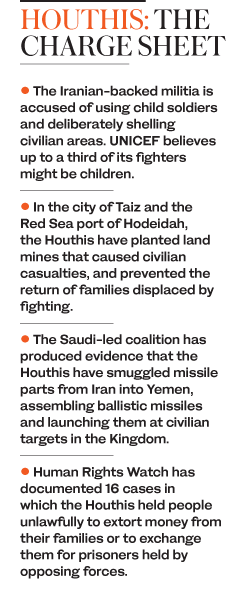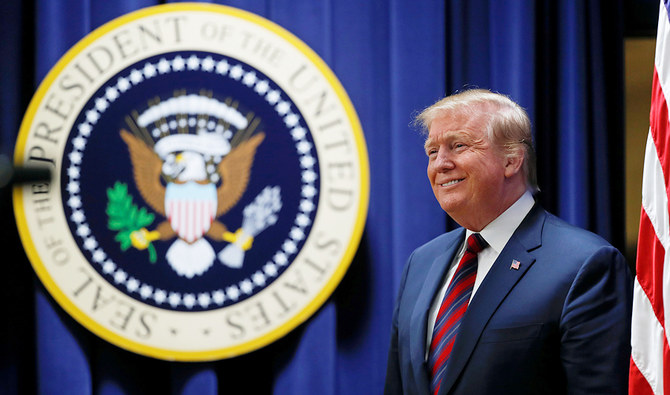JEDDAH: US President Donald Trump’s veto of a Congressional resolution to end US military assistance in Saudi Arabia’s war in Yemen has put the focus squarely where it belongs — on the Houthis, the real perpetrators of the war.
“This resolution is an unnecessary, dangerous attempt to weaken my constitutional authorities, endangering the lives of American citizens and brave service members, both today and in the future,” Trump wrote in explaining his decision.
The president said that the measure would harm bilateral relations and interfere with his constitutional power as commander-in-chief.
He said the US was providing the support to protect more than 80,000 Americans who live in coalition countries subject to Houthi attacks from Yemen.
“Houthis, supported by Iran, have used missiles, armed drones and explosive boats to attack civilian and military targets in those coalition countries, including areas frequented by American citizens, such as the airport in Riyadh,” Trump said.
“In addition, the conflict in Yemen represents a ‘cheap’ and inexpensive way for Iran to cause trouble for the US and for our ally, Saudi Arabia.”
High-ranking officials in the region and many political analysts have been unanimous in their approval of Trump’s decision.
“Saudi Arabia and other partners in the Arab coalition are engaged in a war on terror,” said Saudi political analyst and international affairs expert Hamdan Al-Shehri.
“(The Houthis) have held the whole country hostage at the point of gun. They have been firing ballistic missiles on densely populated cities in Saudi Arabia,” he said.
“Trump has done the right thing. Saudi Arabia and the US are allies in the fight against terror. The Houthis are an extension of the just-sanctioned Iranian Revolutionary Guards Corps.”
Al-Shehri said that US congressmen and women need to understand the ideology of the Houthis. “They are like Daesh, Al-Qaeda and Hezbollah.”
The analyst said the Arab coalition to restore legitimacy in Yemen is trying to do the job of the global community in restoring order.
“There are UN resolutions to this effect that call for the Houthis to be disarmed and their coup to be overturned. Trump understands this and that is why he has done the right thing by vetoing Congress’s decision,” Al-Shehri said.
The UAE, a key part of the Arab coalition, also hailed Trump’s veto. “Support for the Arab coalition is a positive signal of US resolve toward America’s allies,” Anwar Gargash, the foreign affairs minister, tweeted, adding that the decision is both “timely and strategic.”
The Houthis, led by 40-year-old Abdul-Malik Al-Houthi, were sanctioned by the UN Security Council in January 2015 for overrunning Sanaa and sending the internationally recognized government into exile.
Under the slogan “God is great, death to America, death to Israel, curse the Jews and victory for Islam,” the militia has drawn widespread criticism for its brutality. In 2018, Human Rights Watch condemned the group for “frequently taking hostages and for committing other serious abuses against people in their custody.”
Al-Shehri said that Al-Houthi is cut from the same cloth as Iranian leader Ali Khamenei.
 “Al-Houthi has no qualms about putting children and women in harm’s way,” he said. “The Houthis recruit children and women to radicalize them and ensure they continue his campaign of hate. When children and women die at the front, the Houthi leadership paint the Arab coalition as the villain, in order to deceive Western nations.
“Al-Houthi has no qualms about putting children and women in harm’s way,” he said. “The Houthis recruit children and women to radicalize them and ensure they continue his campaign of hate. When children and women die at the front, the Houthi leadership paint the Arab coalition as the villain, in order to deceive Western nations.
“They also use children as cannon fodder to clear minefields and explosives. This is the strategy employed by other militias and terrorist organizations, including Hezbollah, Al-Qaeda and Daesh.
“Women and children are basically used to do the dirty work, and many die or are wounded.”
Few realize how Saudi Arabia and the Arab coalition were forced into the war in Yemen, Al-Shehri said.
“The legitimate president approached his neighbors to save his country from falling into the hands of mercenaries and a well-armed militia — a militia that receives a constant supply of weapons from Iran. The coalition was asked to save Yemen — to free its people from the kidnappers who have held them hostage.”
Al-Shehri said it was a travesty that some in the outside world, including some members of the US Congress, viewed the Houthis as underdogs and victims.
“The Houthis have launched hundreds of missiles into Saudi Arabia. For such people, nothing is sacred. All they want is death and destruction in the Arab world from their missiles and drones. They have managed to hoodwink the international community by saying that the weapons are used in defense of their country. Well, they have taken their hostages and they have starved them. The aim of the Arab coalition is to liberate Yemen from this curse.”
The Houthi leader is no different from Osama bin Laden or Hasan Nasrallah, the Hezbollah chief, he said. “They share not just the same taste in clothes — the long black robe and imamah favored by Iranian clerics and the Hezbollah chief — but the same murderous ideology.”














